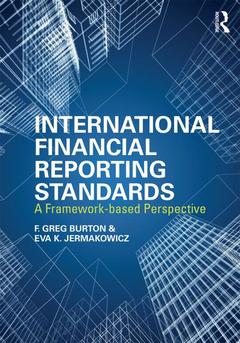Description
International Financial Reporting Standards
A Framework-Based Perspective
Authors: Burton Greg F., Jermakowicz Eva K.
Language: English
Subjects for International Financial Reporting Standards:
Keywords
IFRS; International financial reporting standards; US GAAP; Generally accepted accounting principles; International accounting; Financial accounting; International financial accounting; Securities Exchange Commission; Financial reporting; Auditing; CPA; Cash Flow Hedge; Specific IFRS; Non-controlling Interest; Exchange Rates; Foreign Exchange Rates; Carrying Amount; Noncontrolling Interests; IFRS Financial Statement; Future Net Cash Inflows; Net Identifiable Assets; Biological Assets; Entity’s Financial Position; Revaluation Model; Impairment Losses; Revaluation Surplus; Comprehensive Income; Recoverable Amount; General Purpose Financial Statements; Accumulated Impairment Losses; Defined Benefit Plans; Hedge Accounting; National GAAP; Business Combination; Equity Instruments
107.92 €
In Print (Delivery period: 14 days).
Add to cartPublication date: 03-2015
· 17.8x25.4 cm · Paperback
456.06 €
In Print (Delivery period: 14 days).
Add to cartPublication date: 03-2015
· 17.8x25.4 cm · Hardback
Description
/li>Contents
/li>Readership
/li>Biography
/li>
International Financial Reporting Standards: A Framework-based Perspective links broad concepts and general accounting principles to the specific requirements of IFRS to help students develop and understand the judgments required in using a principle-based standard.
Although it is still unclear whether the US will adopt IFRS, the global business environment makes it necessary for accounting students and professionals to be bilingual in both US GAAP and IFRS. This comprehensive textbook offers:
- A clear presentation of the concepts underlying IFRS
- A conceptual framework to guide students in interpreting and applying IFRS rules
- A comparison between IFRS and US GAAP to develop students? understanding of the requirements of each standard
- Real world examples and case studies to link accounting theory to practice, while also exposing students to different interpretations and applications of IFRS
- End of chapter material covering other aspects of financial reporting, including international auditing standards, international ethics standards, and corporate governance and enforcement, as well as emerging topics, such as integrated accounting, sustainability and social responsibility accounting and new forms of financial reporting
Burton & Jermakowicz have crafted a thorough and extensive tool to give students a competitive edge in understanding, and applying IFRS. A companion website provides additional support for both students and instructors.
Part I: Conceptual Framework 1. Introduction to International Financial Reporting Standards (IFRS) 2. Conceptual Framework for Financial Reporting 3. Fair Value Measurement Part II: Presentation 4. Presentation of Financial Statements 5. Statement of Cash Flows 6. Accounting Policies, Estimates, and Errors 7. Events After the Reporting Period 8. Related Party Disclosures 9. Earnings per Share 10. Operating Segments Part III: Elements 11. Inventories 12. Financial Instruments – Recognition and Measurement 13. Financial Instruments – Presentation 14. Financial Instruments – Disclosures 15. Property, Plant, and Equipment 16. Intangible Assets 17. Investment Property 18. Impairment of Assets 19. Leases 20. Revenue 21. Income Taxes 22. Employee Benefits 23. Share-based Payments 24. Provisions, Contingent Liabilities, and Contingent Assets 25. The Effects of Changes in Foreign Exchange Rates 26. Hyperinflation Part IV: Reporting Entities 27. Business Combinations 28. Consolidated Financial Statements 29. Investments in Associates and Joint Ventures 30. Joint Arrangements 31. Disclosure of Interests in Other Entities 32. Separate Financial Statements Part V: Other Topics 33. Interim Financial Reporting 34. Non-current Assets Held for Sale and Discontinued Operations 35. Construction Contracts 36. Borrowing Costs 37. Accounting and Reporting by Retirement Benefit Plans 38. Accounting for Government Grants and Disclosure of Government Assistance 39. Insurance Contracts 40. Exploration for and Evaluation of Mineral Resources 41. Agriculture 42. First-time Adoption of International Financial Reporting Standards
Greg Burton is the Deloitte & Touche Fellow and Professor of Accounting at Brigham Young University, USA. He served as the Academic Fellow in the Division of Corporate Finance with the SEC in 2008-2009, where he was involved with all IFRS filings and projects. He teaches auditing, financial accounting, and international accounting.
Eva Jermakowicz is a Professor of Accounting and Chair of the Accounting and Business Law department at Tennessee State University, USA. A former Fulbright scholar, she has extensive teaching and professional experience in accounting and financial reporting.




